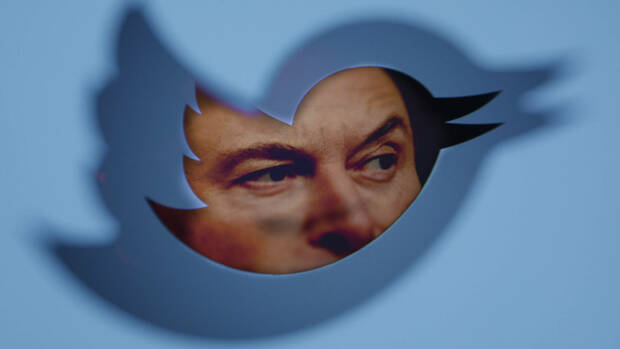The billionaire bought Twitter in October.
(Photo: IMAGO/NurPhoto)
san francisco The US short message service Twitter faces a penalty payment to Germany. The Federal Office of Justice (BfJ) has initiated fine proceedings against the platform, as the authority announced on Tuesday. The ministry sees evidence of a “systemic failure in complaint management” on Twitter.
In October, Elon Musk bought the platform and laid off more than half of the workforce. The team tasked with curbing the spread of hate speech was particularly hard hit by the layoffs.
When the Handelsblatt sent an inquiry to the company’s press office email address, the only response was a pile of feces emoji. Press inquiries have received this automatically for a few weeks. Elon Musk had dissolved the press office. Twitter had left unanswered several inquiries about how to deal with hate messages in Germany over the past few weeks.
Fines of up to 40 million euros can be threatened
The Network Enforcement Act (NetzDG) imposes obligations on online platforms in Germany when dealing with complaints about potentially illegal content. Among other things, they must quickly check whether something is to be classified as illegal according to the NetzDG. An illegal post should be deleted within seven days at the latest. The Federal Office of Justice is responsible for this. The Ministry of Justice provides for fines of up to 40 million euros for violations of the law.
The authority announced that it had been notified of a large amount of content that it believed to be illegal and that, despite user complaints, it had not been deleted or blocked within the legally stipulated periods. The fine proceedings are specifically about posts that were published on Twitter over a period of around four months. “All content contains similar, unjustified defamatory expressions of opinion, all of which are directed against the same person,” wrote the Federal Office. According to the authorities, they constitute an offense.
It would not be the first time that the Ministry of Justice imposed a penalty under the NetzDG. Last year, the authority imposed a fine of 5.1 million euros on the operator of the messenger service Telegram. There, too, it would be about the missing deletion of criminal content.
Musk swaps Twitter logo for dog
Billionaire Musk had recently made several changes to Twitter. Since Monday, many users have been shown a dog head of the Shiba Inu breed instead of the usual blue bird as the Twitter logo. The dog stands for the cryptocurrency Dogecoin. After the logo change, Twitter CEO Elon Musk also shared a meme about the change with his 133.5 million followers on the short message service.
Musk has been posting tweets in support of the Dogecoin for years. With his e-car manufacturer Tesla, he even accepts the cryptocurrency as a means of payment.
After Musk’s tweets, the price regularly shoots up, but then also regularly crashes again. It is currently around 85 percent below the record high reached in May 2021.
That’s why Musk currently has to defend himself against an investor lawsuit. After the price collapse, an investor sued Musk, alleging he was part of an illegal Ponzi scheme in which the price of Dogecoin was pumped up and then crashed.
Musk only wants to give blue ticks to subscription customers
Musk also had the verification badges invalidated on Twitter over the weekend. So far, authorities, companies or well-known people have received a tick confirming their identity as a result of a free check. In the future, these hooks should only be given to paying subscribers, but without checking their identity.
As of Monday, numerous previously verified accounts still had the icon — but the explanatory text for both types of ticks was aligned. Previously, when users clicked on the symbol, they were shown whether it was once given away for free or was now purchased with a subscription payment. Now all ticks state that the account either has a subscription or was previously verified.
An exception was the profile of the “New York Times”, which has not had a verification tick since the weekend. A Twitter user had previously pointed out to Musk that the newspaper had announced that it would not pay for a subscription with the symbol.
“Okay, let’s take it away then,” Musk replied. He then attacked the newspaper in more tweets. Among other things, he wrote that the “New York Times” spreads “propaganda that is not even interesting”.
With agency material
More: Transcript of the first Twitter bank run: How Silicon Valley Bank’s panicked customers ran out of money
